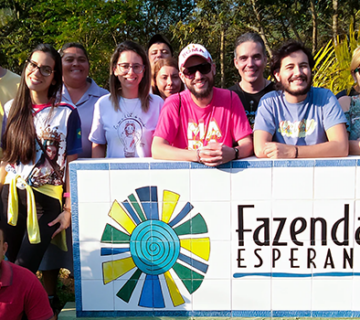
“My dear young people,(…)
The Second World War was raging in Trent, in the northern part of Italy. Bombs were falling night and day, destroying everything. My companions and I had our dreams, our ideals. One of us wanted to form a family, for example; another was looking forward to furnishing her home; still another was seeking fulfillment in studies… But… that fiancé never returned from the front. That home was damaged. I had to leave my philosophical studies in the university of another city because of the barricades of the war. All the things we were hoping to do were crumbling. All our dreams were being shattered by a crude reality. What to do?
In view of this general desolation, of the evident realization that everything passes, a question came to my mind: is there an ideal that no bomb can destroy, for which it is worthwhile spending our life? All at once, an almost blinding light: yes, there is! It’s God. God who is Love. God who loves each one of us, even if we don’t know it. In a flash, I, we, decided to make Him the reason, the Ideal of our lives. We felt that his love was being expressed in thousands of ways.
If he loves us – we decided – we will love him in return. Meanwhile, the ruthless war with its bombings gave no respite. We had to run for refuge many times a day. All we could take with us was a small book: the Gospel. In it we would learn how to love God. We read it: a light illumined those words one by one and an inner impulse urged us to put them into practice.
We found the words: “Love your neighbor as yourself” (Mt. 19:19), and we made every effort to love the sisters and brothers we met, as if they were ourselves. “Whatever you did for one of these least brothers of mine, you did for me”, (Mt. 25:40) we read. “You did for me,” says Jesus. Once out of the air-raid shelter, we looked for these least ones: they were the orphans, the mutilated, the wounded, the poor, the hungry, the homeless… and we loved Jesus in them. The Gospel says: “Give and gifts will be given to you” (Lk. 6:38). We gave the little we had and many things arrived, so many that sacks and packages daily filled the hallway at home. The Gospel admonishes: “Seek first the kingdom of God… and all these things will be given you” (Mt. 6:33). We sought to make love reign within us and whatever we needed arrived. It arrived. It always arrived. We seemed to be living a miracle. Two things made a deep impression on us. The first: every promise of the Gospel was fulfilled. Therefore, the Gospel is true. Jesus keeps his word today too. The second: in the Gospel Jesus asks for love first of all, and in order to love, he asks us to give. A new culture was emerging from that book. Later on, we would call it “the culture of giving”.
In the meantime, more young women and then young men and others joined us in living the same experience. But the dangers of the war increased. Even though we were young, we could have died from one moment to the next. A desire came to our heart: we would have liked to know the words of Jesus that are dearest to him so as to live them in depth, at least in what might be the final moments of our life. We discovered them. This is what he says: “I give you a new commandment: love one another. As I have loved you, so you also should love one another” (Jn.13:34). And he loved us to the point of giving his life for us. We gathered in a circle, we looked at one another and each one declared to the other: “I am ready to die for you”, “I for you…” All for each one. Of course, we continued to carry out all our duties (work, study, prayer, rest), but on the foundation of mutual love. However, it was not always easy to love one another, to keep this unity alive among us. There were times when, due to our shortcomings, we would feel terribly uncomfortable. How could we recompose unity once it was broken? Quite soon we found the answer in the Gospel. Also Jesus, because of us, experienced the pain of disunity: when he cried out on the cross: “My God, my God, why have you forsaken me?” (Mt. 27:46). But he didn’t remain in that separation, in that crack. With the words: “Father, into your hands I commend my spirit” (Lk. 23:46), he went on, thus recomposing his unity with the Father. We decided to do the same with our brothers and sisters. Living this unity, and recomposing it always, brought about something wonderful! Jesus, who had said: “For where two or three are gathered together in my name, (that is, in my love), there am I in the midst of them” (Mt. 18:20), came into our midst spiritually, but truly. When he was in our midst, we experienced a joy we never knew before, a new peace, a new ardor; and his light guided us. And because Jesus was among us, a growing number of people around us acquired or re-acquired the same faith we had. Approximately two months later, there were already five hundred of us, people of all ages, social categories and vocations. Thus Jesus’ dream, implored of the Father before dying, was beginning to come true: “Father, may all be one”.
Certainly, there was also the incomprehension of the world, and trials were not lacking, but the tree that bears fruit must be pruned, says the Gospel. And there were countless fruits. That first group in Trent expanded and had now become a Movement which – once the war had ended – spread like fire, first in Italy, in Europe and then in the other continents. Now it is present in 182 nations of the world, practically everywhere.
Thus love, true love is ablaze in every corner of the earth: it is an authentic revolution of love.
Besides the Catholics who participate in the life of the Movement, there are Christians from 350 Churches, faithful of the major religions, as well as people of good will who have no specific religious belief. They are all linked by the duty to love which is inscribed in the DNA of every human being and present in the principal sacred books of most religions. From the beginning of our adventure, we had understood that through this spirit of love, unity, and brotherhood, we would see across the globe the birth of “new men and women” renewed by the Gospel. And so it is today. At this point, it is a consoling phenomenon which involves millions of people. We had understood that we would see “new cities” completely transformed by true love, by peace, justice, and freedom. And now twenty little towns, more or less complete, have risen up in different parts of the world. At the heart of these towns are people of different ages, nations, races, and languages; all united, all one heart, a witness to the possibility of a future united world. We also foresaw the renewal of entire nations, the rising of “new peoples”.
Youth: the Gen Movement, New Generation, was born
Over the years, other young people came to whom we passed on, so to speak, our flag. On one side of the flag is written: unity, our goal; on the other side, the key to accomplish it: Jesus forsaken. This marked the birth of the Gen Movement, the new generation.
Throughout the years, the young people of the Movement have always represented for us the authenticity, purity, courage, vastness and concreteness of our Ideal, owing to their characteristic natural and spiritual qualities. During these past decades their contribution to the common cause has been consistent and decisive.
Africa: in Cameroon a tribe was leading to the extinction of the population
Today I can tell you about only one of their projects. In order to understand it well, I must tell you a story, which sounds almost like a fairytale, about an African people in the English-speaking part of Cameroon. In 1966 we learned of the situation of the Bangwa tribe, people who were living in the heart of the forest, in very poor conditions, affected by many illnesses, with a ninety percent infant mortality rate, which was leading to the extinction of the population. In desperation they decided to pray incessantly for a whole year to the supreme Being of their traditional religion, but without results. “Maybe we have prayed too little,” they said; “let’s pray for another year.” But at the end of the second year, still nothing. “Maybe we are too bad. Let’s entrust ourselves to the prayers of the closest Catholic mission and give them an offering,” they concluded. The bishop, who later came to Rome, asked us for focolarini doctors. They left immediately and shortly afterwards opened a dispensary in a squalid shed where even snakes occasionally passed by. They felt that their first duty was to love one another in order to bear witness to the Gospel they were living.
They also loved all those people, indiscriminately, one by one, following the example of the heavenly Father who sends the sun and the rain on the good and on the bad. They loved always, they loved first without waiting to be loved….
In one of my first visits there during those years, something curious happened. While groups of Bangwa took turns performing dances in a large clearing in the forest in front of us and in the presence of their wise and prudent king, Fon Defang of Fontem, I had like a foresight. It seemed to me that God, like a sun, was enveloping all of us together; and in that sun, which was almost like a divine sign, I seemed to foresee a city rising up there, in the middle of the tropical forest, a city we would build together, a city to which many people would go in order to see what love is, what human brotherhood is. And on that occasion I announced what I had seen.
1968 – Our young people launched the so-called “Operation Africa”
Quite soon all kinds of help arrived. Our young people, the gen around the world, became involved in this in a special way. They launched the so-called “Operation Africa” and encouraged many others to join the project. Thus it was possible to build a modest hospital and to open schools. They channeled a spring of water running down the mountain in order to generate a bit of electricity for the hospital. At first they built mud huts and later on more solid houses. From time to time, some gen would go there; they would roll up their sleeves and offer to work for one or two years.
The focolarini and the gen continued to love all of those brothers and sisters who were in dire need, and to tenaciously strengthen their love for one another. They themselves, their way of behaving, were the only living words they could offer to that people. Some of the Bangwa people observed them for months: still marked by years of colonialism, they wanted to see if these white people were motivated by selfish interests.
Convinced of the sincerity and transparency of these new guests, they decided to collaborate. Thus focolarini, gen, and Bangwa found themselves all joined together as brothers and sisters in building the common good of that population.
The developments
Years passed and everything grew: the hospital was enlarged; the infant mortality rate was reduced to two per cent; the plague of sleeping sickness was eradicated; a college was built with all the lower and higher classes; twelve roads were opened to connect the various villages; our people, with the help of the Bangwa, built about sixty more houses; the Bangwa, with our help, built many others. A beautiful church was built to meet the needs of the many Christians present. In the meantime, Fontem became first a sub-prefecture, and then a prefecture. The government opened some schools and installed an aqueduct to bring electric light.
My return to Fontem after thirty years
Recently, I returned to Fontem after more than thirty years. The new beautiful and large town is there for everyone to see. It is frequently visited by people of other African nations, and others as well. The fame of it’s special characteristic is spreading. We visited every corner and we saw happy people, very beautiful, healthy and well-nourished children, robust and strong young people, well-dressed women… They all greeted us with a smile. They lavished us with gifts during those days. We learned that the hospital is so esteemed that even people from the capital prefer to be treated there. The schools are highly regarded. The children are sent there by their Bangwa parents who themselves earned degrees in these schools and now occupy positions of responsibility as bank directors, lawyers, university professors, as well as deputies, consuls, ambassadors… also in some European nations and in the United States. We saw what love can do, what brotherhood can build when it is lived among people of different continents who have become one.
And now? Many Bangwa continue to profess the traditional religion, and the main framework of their life is still supported by an ancestral system based on thousands of traditional norms, but we can say that brotherhood prevails and that it works “miracles”. The new king, Dr. Lucas Njifua Fontem, son of the previous king, saw and understood: “All those who follow this way,” he told us, “are upright and just and they work together for the good of the people.” He openly declares that the inhabitants of Fontem who follow the Movement never present any problems. They don’t fight over land boundaries – they define them in harmony and live in peace. They do not rob from one another; they do not injure and much less kill; they do not seem to have any need for the police; illiteracy is diminishing; they find solutions to all their family problems; they defend life, which has always been greatly respected by the African culture, at all ages; they meticulously look after their health; they respect authority and have profound esteem for the elderly; they are incredibly generous: the “culture of giving”, effect of brotherhood, excels. For this reason, during my stay there, the king acting as the head of his people, invited everyone, with determination and ardor, to adapt the spirit of our Movement. Living the gospel message of love is therefore transforming a tribe into a people, and this people has turned the portion of humanity present there into a socially solid brotherhood, which has also achieved its political goal: the common good. And mutual love is transforming this people into Kingdom of God, almost into a small Paradise. This, then, is really the moment of new peoples.
As you have heard, the leading figures of the “miracle” just described were both the focolarini, who spent their energies, their time, and some, even their lives, and our young people who worked hard and long in every part of the world.
Project Africa 2000
Today, many things are still lacking in Fontem. And not distant from the Bangwa people, in Fonjumetaw, lives another people whose king has the same dream as the king of Fontem. We met him and we have begun to help. But Fonjumetaw is still surrounded by an impenetrable forest; there is illness and hunger…
During my stay there, ecclesiastical and civic authorities, who know of the presence of the Movement in many nations of the African continent, encouraged us saying: “What you have done in Fontem, you must do all over Africa and in Madagascar.”
My dear young people, this is a challenge. Shall we accept it? The focolarini, to the extent that they can and with the help of God, have already said “yes”. What will the young people say? I am certain of their generosity.
The mandate
Let us love, my dear young people, let us continue to love and the whole world will change. Let us love and contribute toward building the “civilization of love” which our planet awaits, in the midst of tensions, but also in view of the new openness and opportunities of our times.
Jesus wants the world to be invaded by love: “I have come to set the earth on fire, and how I wish it were already blazing!” (Lk. 12:49). Let us give him the possibility of seeing it blaze also through our commitment. Then the idea of a more united world, of a united world, towards which many young people are striving today, will not be only a utopia, but it will become, with time, a great and very consoling reality. The future is above all in your hands. With God in our heart, everything is possible. And God certainly wants it!
Will we, will you be equal to the task?


 Italiano
Italiano Español
Español Français
Français Português
Português


